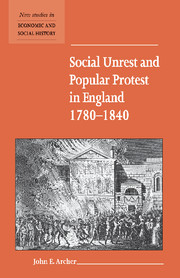Book contents
2 - Agricultural protest
Published online by Cambridge University Press: 05 July 2015
Summary
The rural labouring communities of the Southern and Eastern counties of England not only entered the darkest decades of their history between the late eighteenth and the middle of the nineteenth centuries, they also suffered far more hardship and oppression than any other occupational group. Given the appalling state of rural England, the specific history of rural protest has not attracted, until recently, quite the same interest as have the Luddites or political reform. This is all the more surprising when it is remembered that rural Southern England was the arena both for the most widespread popular uprising of the nineteenth century – Captain Swing – and also for one of the bloodiest in the strange tale of Bosenden Wood. There have been two major exceptions to this neglect, first the Hammonds' study of 1911 (1920) and the more influential work on Captain Swing by Hobsbawm and Rudé (1973). For many years it was believed that, with the exception of Swing and Tolpuddle, there were few rural events worth investigating. This changed when the followers of E. P. Thompson, and of Hobsbawm and Rudé, armed with doctorates covering most grain-growing counties of Southern and Eastern England, set about destroying the English rural idyll so resonant in earlier histories. Figuratively speaking, the ‘ploughs and cows’ economically oriented histories (the phrase is Snell's), were smashed or maimed by this younger generation of historians.
There is, however, a large measure of agreement on the condition of the farm labourers who, during the course of the eighteenth century, experienced a progressive deterioration in terms of both their standard of living and their quality of life (Reed and Wells 1990: 29-53). Three words would seem to describe the downward spiral into which they were sucked: proletarianisation, pauperisation and disinheritance. Such alterations were both the cause and the consequence of wider social and economic structural changes.
- Type
- Chapter
- Information
- Publisher: Cambridge University PressPrint publication year: 2000
- 1
- Cited by



